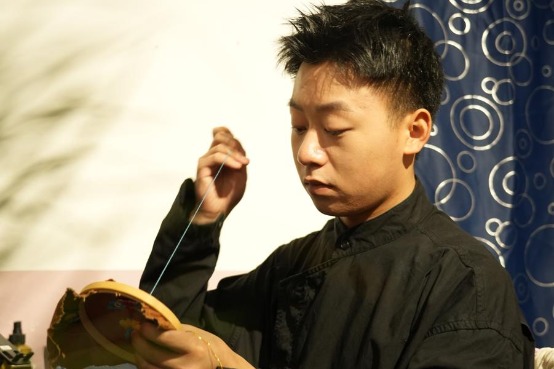Booked for fraud

Chinese mainland students enrolling in Hong Kong universities face a surge in telecom scams, with first-year students particularly vulnerable due to unfamiliarity with local systems and limited support networks. Li Lei reports from Hong Kong.

Lonnie Zhang's graduate studies in Hong Kong nearly ended before they even began.
Her nightmare started as she sat in her dormitory room when a uniformed "officer" claiming to be from Wan Chai Police Station barked out orders in Mandarin tinged with a Cantonese accent on her laptop screen: "Don't move. Keep your hands visible." The impersonator's badge gleamed in harsh artificial light, his tone razor-sharp with military precision.
The Chinese mainland student was just weeks into her dream course at a top local university when she found herself accused of money laundering. Her student visa - and her future - hung in the balance.
"He knew my name, my background, even an old Shanghai phone number I had years ago," says Zhang, recalling the encounter two years ago. The imposter demanded immediate proof of her "innocence" by instructing her to transfer money to a designated account or face deportation. Hands trembling, Zhang fumbled for a phone under her notebook and typed a frantic WhatsApp message to her roommate: "Call the police now."
The reply was swift: "There's nobody by that name at Wan Chai Police Station. It's a scam!"
Zhang then noticed the flaw. While the fraudster's jawline seemed aligned perfectly with his forged badge, his cheekbones flickered with unnatural pixilation - the telltale sign of an artificial intelligence face swap. With adrenaline surging, she terminated the call midway.
Zhang's ordeal tells of a disturbing surge in AI-assisted scams specifically targeting mainland students during their most vulnerable period - their first weeks in Hong Kong.
Drawn by affordability and cultural ties, tens of thousands of mainland students, many from affluent families, flock to universities in the special administrative region annually. Yet, many arrive totally oblivious to the city's legal landscape and social practices and devoid of support from local networks, rendering them key targets for scammers.
Criminals, armed with stolen personal data, exploit these vulnerabilities with frightening accuracy.
Exploiting fresh faces
The magnitude of the problem became evident when Chris Tang Ping-keung, the SAR's secretary for security, revealed in January that scams involving fake government officials accounted for the majority of 318 reported telecom fraud cases involving mainland students in 2024, with nearly 80 percent of them targeting first-year students. The victims lost a total of HK$230 million ($29.5 million), including tuition and accommodation fees, after being duped into paying the money into overseas accounts.
In one case, an 18-year-old University of Hong Kong freshman parted with HK$9.2 million to fraudsters posing as mainland police, while in another case in 2023, a 19-year-old from Liaoning province took his own life after falling victim to a similar scam, leaving his family mired in crippling debt.
Experts have identified multiple factors that make students susceptible to fraud, such as ignorance of Hong Kong's judicial setup, the psychological strain of adapting to a new environment, and a false sense of security in what's consistently ranked as one of the world's safest cities.
Francis Fong Po-kiu, honorary president of the Hong Kong Information Technology Federation, notes that while elderly victims typically fall prey due to technological illiteracy, younger tech-savvy students have been targeted because they don't understand Hong Kong's systems. The widespread availability of AI tools has exacerbated the problem, making impersonation more convincing than ever.
"The same risks apply to Hong Kong residents working or studying on the mainland," says Fong, urging broader implementation of verification technologies like Huawei's DeepReal that can instantly authenticate images and videos.
Police tech fightback
The Hong Kong Police Force have stepped up anti-fraud efforts on all fronts. Acting in concert with banks last year, the force successfully intercepted scams, thwarting fraudulent transactions worth HK$1.48 billion. The force also launched Scameter+ - a mobile app that screens suspicious social media accounts, payment details and phone numbers - and cyberdefender.hk, an educational website explaining common scam tactics. A 24/7 anti-fraud hotline (18222) was set up for immediate verification of potential scams.
The initiatives have slowed the year-on-year growth of fraud cases to 11.7 percent - a significant drop from surges of 40 to 50 percent in the past.
Yet, student victims tell a different story. Reported cases among them had jumped by nearly 90 percent - from 170 in 2023 to 318 last year - revealing unique challenges in protecting young newcomers.
The police have also been distributing anti-fraud study kits and brochures, conducting campus awareness lectures and incorporating scam education into university curriculums. Since 2023, institutions like The Hong Kong University of Science and Technology have included police-produced study kits featuring videos of common scam tactics in freshman orientation courses, benefitting 19,000 mainland students so far.
However, protection needs have also grown as the number of mainland students in the SAR skyrocketed to 56,000 last year - almost triple the figure a decade ago.
"Post-pandemic applications for admission to Hong Kong universities have exploded, even surpassing those for tertiary educational institutions in the United Kingdom," notes Wang Yunqi of education consultancy, UniFuture.
Paradoxically, he says Hong Kong's appeal stems partly from its perceived safety compared to Western countries, where worries about gun violence and anti-Asian sentiment have deterred students.
The surge in Hong Kong's student population, combined with an influx of mainland professionals under talent attraction programs, has dealt a blow to police efforts to stem fraud.
Students lead defense
The challenge becomes increasingly complex as fraudsters continue refining their tactics, deploying everything from investment and romance ruses to impersonating customer service agents offering fake refunds for concert tickets or bogus deliveries. At the height of the COVID-19 pandemic, tricksters even posed as health officials demanding payments for mandatory isolation periods.
Despite comprehensive campus campaigns to raise students' awareness of fraud, including lectures, posters and messages on billboards in restrooms, then-police commissioner Raymond Siu Chak-yee says many students remained disengaged. This has led officers to adopt more student-centric approaches to reach out to the city's growing mainland population.
Wang Yu, a mechanical engineering doctoral candidate at HKUST, was appointed as one of the university's 25 anti-fraud ambassadors by the Kowloon East Regional Police Headquarters. These ambassadors work closely with the police to weave scam prevention into popular student events. They also manage multiple WeChat groups - the preferred platform for mainland students - where officers share updates on emerging scams and field questions about suspicious messages. The groups provide a platform for former victims to share their experiences, creating warning systems and support networks.
The Kowloon East Regional Headquarters stepped up its commitment to this partnership in January with a social media post vowing to create a "zero-fraud campus". The Hong Kong Police Force told China Daily that student groups now form a cornerstone of its anti-fraud strategy. Together, they have updated freshmen's handbook content, disseminated tips via WeChat, organized campus awareness campaigns, and hosted lectures with victims to drive home a crucial message: Anyone can be targeted.
Wang, president of the HKUST's Mainland Students and Scholars Society (MSSS) in 2020-21 and current president of the Hong Kong Mainland Students Association, says traditional anti-fraud lectures face an uphill battle. Before becoming an ambassador, he and fellow student leaders saw the need to sugarcoat security messages while engaging in activities like free movie nights and orientation galas - often sweetening the deal with sponsored ice cream and other giveaways. Their most innovative creation is a campus telephone booth that simulates real scam calls, giving students firsthand exposure to fraudsters' tactics.
"Most students don't believe they would ever fall for a scam," says Wang. "Attending anti-scam lectures can make them feel like admitting a lack of common sense, and nobody wants that stigma."
The MSSS initiative has revealed a potent but underutilized weapon in Hong Kong's fight against telecom fraud - mainland student organizations. Experts note that by combining these groups' event-planning expertise with police knowledge of fraud prevention, outreach efforts have become more effective and engaging for typically inattentive students.
Lau Chi-pang, Lingnan University's associate vice-president, emphasizes that groups like MSSS represent a valuable, yet frequently ignored resource. While universities have traditionally relied on emails to disseminate anti-fraud information, such a passive approach has largely failed to capture students' attention, leaving many newcomers dangerously uninformed. At Lingnan University, incorporating mainland student associations into awareness campaigns has yielded good results. "The outreach effectiveness is improving," says Lau.
According to the Hong Kong Mainland Students Association, 18 such groups operate across 12 local universities, interfacing with mainland students through orientation programs, career services, cultural events and briefings before they arrive in Hong Kong, making them ideal partners for police outreach efforts.
Wang identified a crucial disconnect during his initial collaboration with Hong Kong police in 2020.Cultural barriers were undermining prevention efforts, like Cantonese-language posters featuring local emojis that left Mandarin-speaking students baffled. The urgency to bridge the gap intensified in late 2021 as mainland students returned for in-person classes amid COVID-19. Wang's proposal for engagement found immediate traction with the Kowloon East Regional Headquarters, resulting in an innovative visit program for 80 HKUST students that replaced dry lectures with police dog demonstrations and equipment displays.
Such innovative collaboration has established an ongoing partnership model. Police now regularly appear at student galas to deliver anti-fraud messages in more engaging settings. The HKPF says it has also expanded its presence on mainland-favored platforms like Douyin where it has cultivated 4.72 million followers.
Prevention over cure
Officials and industry experts are advocating early education for students before they begin their studies in Hong Kong to bolster their vigilance, warning them not to let their guard down even in one of the world's safest cities.
During the annual legislative sessions in Beijing in March, Chen Siyuan, vice-minister of public security and a national political advisor, announced plans to intensify anti-fraud messaging through media and online platforms, particularly targeting Hong Kong-bound students. This commitment was echoed by Siu, who pledged closer collaboration with the mainland authorities in educating prospective students and their parents before they set foot in the SAR.
The Hong Kong Information Technology Federation's Fong says it's critical to have stronger privacy protection on social media and e-commerce platforms that are hunting grounds for fraudsters seeking personal data to legitimize their scams. "Whether it's in Hong Kong or on the mainland, young people generally show a low degree of concern about protecting their privacy," he says.
The preventive measures taken have become painfully clear to Lonnie Zhang, now a mainland e-commerce entrepreneur after having graduated last year.
Reflecting on her ordeal, she agrees that rigorous privacy protection is vital when conducting surveys or sharing personal information, as scammers had weaponized her personal information to project credibility.
"Had they brought up unrelated topics like real estate or cars, I might have immediately realized it was a scam."
Zhao Yimeng contributed to this story.
Contact the writer at lilei@chinadailyhk.com





































